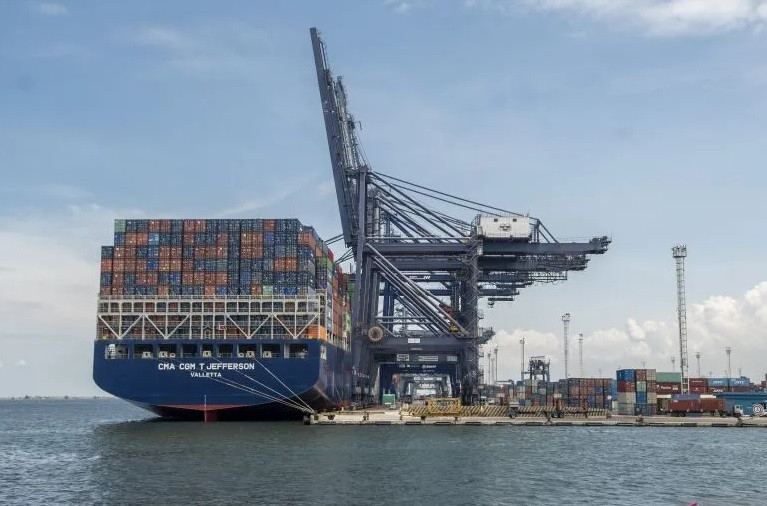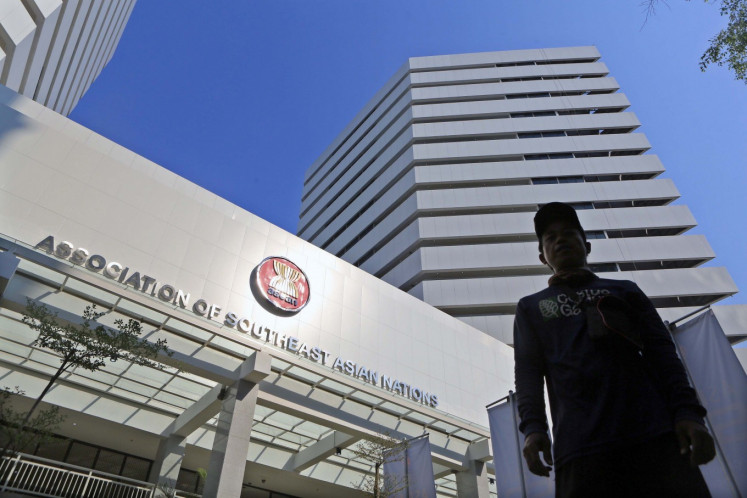Popular Reads
Top Results
Can't find what you're looking for?
View all search resultsPopular Reads
Top Results
Can't find what you're looking for?
View all search resultsEasing forex market liquidity
The regulation, if properly enforced, will help the government clamp down on undeclared offshore profits and tax evasion.
Change text size
Gift Premium Articles
to Anyone
 Daily workload: Containers are loaded onto a vessel at the Pelindo II Port in Tanjung Priok, North Jakarta, on Nov. 15, 2022. The country’s exports grew by 26.07 percent year-on-year in 2022 to US$291.97 billion, up from $231.60 billion in 2021, according to Statistics Indonesia (BPS). (Antara/Muhammad Adimaja)
Daily workload: Containers are loaded onto a vessel at the Pelindo II Port in Tanjung Priok, North Jakarta, on Nov. 15, 2022. The country’s exports grew by 26.07 percent year-on-year in 2022 to US$291.97 billion, up from $231.60 billion in 2021, according to Statistics Indonesia (BPS). (Antara/Muhammad Adimaja)
T
he government will soon enforce a regulation that requires companies exporting mining, plantation, forestry and fishery products to repatriate their export earnings and keep a portion of them in the domestic financial system for at least three months. Failure to comply with the new policy will result in the government suspending their export licenses.
The new policy, stipulated in Government Regulation No.36/2023, does not violate the fundamentals of Indonesia’s open capital account regime, which has so far been one of the main attractions for foreign investors to Indonesia. But the government still considers such compulsory repatriation necessary to increase United States dollar liquidity in the foreign exchange market, because the foreign trade surplus has not always resulted in a similarly sizeable increase in the country’s foreign reserves.
Starting next month, exporters operating in the mining, plantation, fishery and forestry industries, and earning US$250,000 or more, will have to keep at least 30 percent of their earnings in the domestic financial system for a minimum of three months.
The effectiveness of the new policy, although welcomed as a strong bid to enhance forex market liquidity and stabilize the rupiah exchange rate in the volatile global financial market, will still depend on the interest rates of the forex term deposits offered by Bank Indonesia and the investment instruments issued by the banks appointed to keep the forex export earnings. The interest rates should be competitive with the US dollar interest rates in Singapore, or exporters will do what they can to circumvent the regulation, possibly even under invoicing their exports.
The new policy is not as draconian as it seems, because exporters are required only to repatriate their export earnings and put them into special accounts at the forex banks and the export financing agency. They are not obliged to convert their export earnings into rupiah, except in a time of macroeconomic instability. They are also still free to use their forex earnings for servicing their foreign borrowings, imports and other business activities in line with the Investment Law.
One advantage of the forex ruling is that enforcement and administration will become less complex because the requirement to repatriate export earnings is not imposed on manufacture exporters, which still depend a lot on imported materials and components.
The regulation, if properly enforced, will not only strengthen the base of the domestic forex market, therefore preventing steep volatility in the rupiah exchange rate, but will also help the government clamp down on undeclared offshore profits and tax evasion.
Effective enforcement of the compulsory retention of a portion of export earnings will shield the country from risks associated with fluctuations in international capital flows. The government does not need to resort to outright capital control measures because Bank Indonesia is still able to manage the floating rupiah exchange rate and the banking system remains stable and strong according to the International Monetary Fund in its latest policy review of Indonesia last month.
We hope all these measures will help the country cope with the uncertainty of the global financial market, especially because the easing inflation pressures in the US will most likely prompt the Federal Reserve to continue the pause its money-tightening policy which it began last month.
Strongly upholding the open capital account regime, even amid global financial uncertainty, should serve as a strong signal to the international market that the government remains strongly committed to good economic policies. The open capital regime will thus keep the government on its toes with regards to its policies, because a perceived deterioration in its policies could cause domestic and foreign investors to suddenly remove capital from the country.
This, in turn, provides a strong incentive for the policymakers to adopt and maintain sound policies, with obvious benefits in terms of long-term growth. Capital inflows should also facilitate the transfer of foreign technological and managerial know-how, and encourage competition and financial development, thereby promoting growth.










